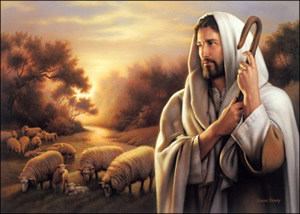4th Sunday of Easter – Cycle B (Jn 10:11-18)

Jesus, The Good Shepherd
True love does not come from within us; it comes from God. You cannot know love through the external; it cannot be found in a book or a lecture; it must be experienced by living and loving God. We live in a world that has little time for God, little time for love; it is because we know so little of God that we fail to find true love.
I further remind my students that we owe God our love in return. He created us out of love and you have to love Him for our creation. Up to this point all heads are usually nodding in agreement. But then comes the kicker. Since God created us out of love and we must love Him, we must also love God’s creation, all of them, most importantly, every person created by God. If you don’t love others then how can you truly love God?
Loving others is seldom easy and it often comes with a heavy price. Certainly God paid dearly with the death of His only Son on the cross, so we must expect to pay the price if we love God and love others. We may face rejection and abuse, perhaps even suffering or death, but if you love God you have no choice but to love your neighbor as yourself. Dr. Michael Duduit, Executive Editor of Preaching magazine writes that “The life of love is not an easy or a common one, but it is the road that leads to Christ.”
God’s love for us is manifested through Jesus who died so that we could know God’s love. God so loved the world that he sent His only son, Jesus Christ, who became man, suffered, died, and rose for the forgiveness of sin and the salvation of the whole world. Everyone is included, no exceptions. God loves us all, even those who might not believe in Him. Jesus said, “I have other sheep that do not belong to this fold. These also I must lead, and they will hear my voice, and there will be one flock, one shepherd.” [Jn 10:16] God runs an “all inclusive” club; everyone is welcome to join.
Jesus tells us “I am the good shepherd.” [Jn 10:11] References to shepherds can be found throughout the bible. Kings, and those in leadership positions, both political and religious, are often metaphorically spoken of as shepherds of their people. It is a reference that is generally understood and accepted. However, especially today, most of us respond negatively if we are called sheep. We think of sheep as timid creatures, not very bright, easily fooled by wolves in sheep’s clothing, led like lambs to the slaughter. The imagery is just not very appealing, to say the least.
But, in the English language, sheep have a rather singular distinction, because the word has no singular, only the plural. Sheep belong to a flock, following a shepherd who they trust to keep them safe. The shepherd knows his flock and as Jesus tells us “I am the good shepherd, and I know mine and mine know me, just as the Father knows me and I know the Father; and I will lay down my life for the sheep.” [Jn 10:14-15] To be a Christian means we belong to Christ, the good shepherd, and it means we belong together, not as individuals, but as a community of believers who share in the body of Christ and our love for one another.
But…does that have to include everyone—even those who aren’t, you know, like us? After all, if they aren’t with us they must be against us, right? How can they be included when they don’t believe everything that we believe? If they aren’t part of our community of believers then they can’t be loved by God quite as much as we are. But the truth is that it is not up to us to decide who is in or who is out. Jesus tells us that “I have other sheep that do not belong to this fold. These also I must lead, and they will hear my voice, and there will be one flock, one shepherd.” [Jn 10:16] The Good Shepherd loves all, leads all, not just our flock.
But if everyone is invited, who will be included? Jesus tells us “For I was hungry and you gave me food, I was thirsty and you gave me drink, a stranger and you welcomed me, naked and you clothed me, ill and you cared for me, in prison and you visited me.” [Mt 25:35-36]
So, what are we to do? For starters, like Jesus, we must open our hearts and arms to everyone; we must love our neighbor as our self; we must love everyone as our Heavenly Father loves each of us; for, if we love the stranger, we will soon discover that the stranger is no longer strange, but our brother or sister.
When we look at others through the eyes of Christ we will see, as in a mirror, a reflection of our self—the image and likeness of God.
